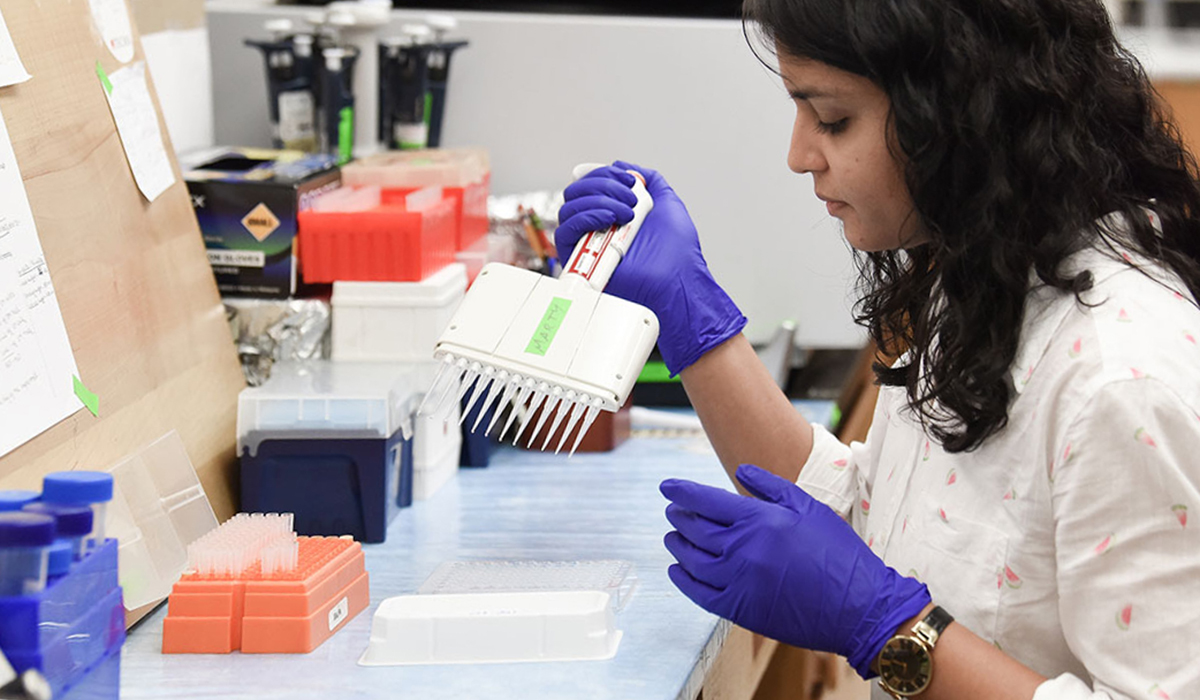Biotechnology harnesses cellular and biomolecular processes to develop technologies and products that help heal the world, feed the world, and fuel the world. Our program is flexible, allowing a student to create their own program of study from course selections in biology, clinical science, microbiology, cell biology, microphysics, and biochemistry.
The Biotechnology program offers opportunities in five major sectors:
- Drugs and pharmaceuticals
- Agriculture feedstock and chemicals
- Research, testing, and medical laboratories
- Environmental applications
- Medical devices and equipment
The Washington metropolitan area has the 4th largest core concentration of biotechnology companies in the country, where students will be able to engage in research with private and public research institutions. Personal mentoring in addition to graduate advisors, presentations by accomplished role models, and opportunities for regular social and professional interactions will be offered to help nurture your career development.
 Credit Hours: 30
Credit Hours: 30
 Tuition: $1,650 per credit hour
Tuition: $1,650 per credit hour
 Curriculum:
Curriculum:
-
Accelerated Degree
A typical course selection for the accelerated (1.5 years) M.S. in Biotechnology degree might be as follows:
- Biology Core Requirements
- Molecular Genetics and Recombinant DNA, Biol 586 (3 credits) OR Cell Structure and Function, Biol 559 (3 credits)
- Gene Organization and Expression, Biol 538 (3 credits) OR Comparative Metabolism, Biol 774 (3 credits)
- Microbiology Seminar, Biol 713 (1 credit)
- Cell Biology Seminar, Biol 777 (1 credit)
- Biotechnology Core Requirement
- Principles and Practice in Biotechnology (3 credits)
- Regulatory Processes for Domestic and Global Biotechnology Products (3 credits)
- Entrepreneurial Biotechnology (3 credits)
- Essentials of Biotechnology Project Management (3 credits)
- Choice of two Elective Core (3 credits each)
- Industry/Research Laboratory Internship (4 credits)*
- The internship can be adjusted over a longer period of time for part-time students, or depending on the situation.
-
Full-Time Degree
A typical course selection for the full-time (2 years) M.S. in Biotechnology degree might be as follows:
Year 1, Fall Semester (7 credits)
- Biology Core Requirement
- Molecular Genetics and Recombinant DNA, Biol 586 (3 credits) OR Cell Structure and Function, Biol 559 (3 credits)
- Microbiology Seminar, Biol 713 (1 credit)
- Cell Biology Seminar, Biol 777 (1 credit)
- Gene Organization and Expression, Biol 538 (3 credits) OR Comparative Metabolism, Biol 774 (3 credits)
- Biotechnology Core Requirement
- Principles and Practice in Biotechnology (3 credits)
- Entrepreneurial Biotechnology (3 credits)
- Regulatory Processes for Domestic and Global Biotechnology Products (3 credits)
- Essentials of Biotechnology Project Management (3 credits)
- Industry/Research Laboratory Internship (4 credits)*
- The internship can be adjusted over a longer period of time for part-time students or depending on the situation.
- Choice of two Elective Core (Choose from the List of Electives) (3 credits)
List of Elective Courses
- Bacterial pathogenesis
- Bioinformatics
- Biophysics
- Cell Biology seminar
- Developmental biology
- Emerging infectious diseases
- Enzyme biochemistry and drug discovery
- Immunology
- Membrane trafficking
- Microbiology seminar
- Model Organisms and Human Disease
- Molecular diagnostics
- Research Problems
- Research topics
- Signal transduction
- Virology

